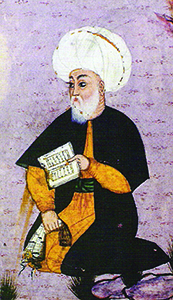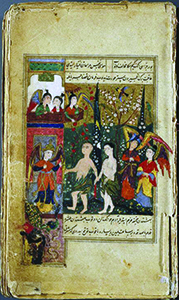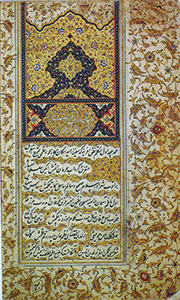The great Azerbaijani poet Mohammad Fuzuli
Muhammad Fuzuli (Muhammad ibn Suleyman) (1498-1556) was a genius classic author of Azerbaijani poetry, and who wrote in native language.
Fuzuli was born in the city of Karbala, which was part of the Aghgoyunlu Azerbaijani state at that time, and was originally from the Bayat Azerbaijani tribe. His father, who was a cleric, gave his son a perfect education, and he acquired knowledge of oriental literature from the poet Habibi. Fuzuli studied in Hilla, Karbala and Baghdad, mastered the sciences of medicine, astrology, astronomy, logic, mathematics, as well as the systems of ancient Greek and Eastern philosophy, and mastered the poetry of Khaqani, Nasimi and Nizami.
Fuzuli's poetic pseudonym "fazl" means the union of science and knowledge. His first famous poem – qasidah was dedicated to Alvand, the ruler of Aghgoyunlu. When Baghdad became part of the Safavid state in 1508, Fuzuli had already became famous as a young poet. He dedicated his first large-scale work "Bangu Bade" in the form of masnavi to Shah Ismail Khatai. During the rule of the Safavids, Fuzuli was under the protection of the Shah's local deputies, a situation that lasted until the Ottoman conquest of Baghdad in 1534. During the Ottoman rule, the poet taught in Baghdad, and later became a servant of the Imam's mausoleum in Najaf. To the poet, who became famous in the Muslim East, was given a pension by the Ottoman sultan, but it was very difficult to get it due to bureaucratic obstacles. The poet described these obstacles in his famous work "Shikayetname" (“Book of complaints”). At the end of his life, Fuzuli suffered from financial difficulties and died of cholera in 1556.
To date, 16 works of the poet are known written in Azerbaijani, Persian and Arabic languages. Fuzuli is mainly considered a lyric poet. "Leyli and Majnun" written in the Azerbaijani language by the poet , whose most of poetic works are in the form of ghazals, is considered the pinnacle of his art.
Both during his lifetime and after the poet's death, Fuzuli's works were distributed in manuscript form. However, because it did not meet the growing needs of readers, Fuzuli's manuscripts have been repeatedly published in Azerbaijan, Turkey, Iraq, Middle Asia since the first half of the XIX century, and about 40 works in Cairo, Istanbul, Khiva and Tashkent since the early XX century.
In "Shikayetname", the poet exposed and criticized the shortcomings of the existing system, robbery, bribery, flattery and the destruction of public funds. Sohbatul-Asmar ("Fruit Debate") is considered to be the first swallow of the poet's epic work. In "Bangu Bade", the poet warns healthy people seeking refuge from evil and unpleasant events by using opium that it is dangerous. Fuzuli defends the ordinary human right to happiness with his life-loving creativity. It is from this point of view that the metaphorical work "Saqinama", in which musical instruments speak of human flaws, should be accepted. Allegorical images and comparisons are reflected in his works “Sahhat ve Maraz” ("Health and Disease"), "Rindu-Zahid".
Fuzuli's most popular, highly artistic work is the poem "Leyli and Majnun". The subject of the work is taken from Arabic folklore. Fuzuli used this folklore material in a unique way and masterfully, and with his artistic expression surpassed all the versions written before him, creating an original poem, continuing the traditions of his predecessors, especially Nizami Ganjavi. Unlike Nizami, in Fuzuli's poem were placed about 30 lyrical poems that are independent but harmoniously connected with the poem.
The language of Fuzuli's poetry is, in fact, the language of the people, bright, deep and emotional. Music was composed to some of the poet's works, which were performed by ashigs and singers.
Fuzuli's work had an impact on the development of the literature of the peoples of the Near and Middle East.


